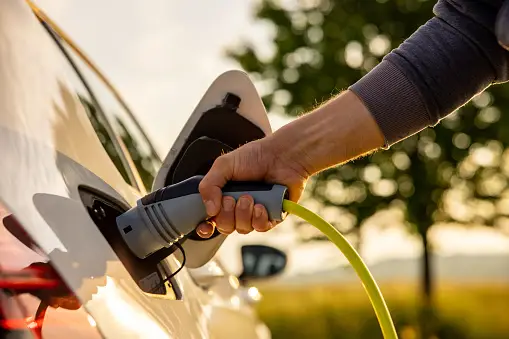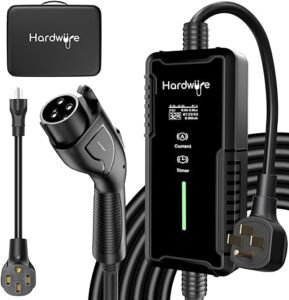Portable EV Chargers
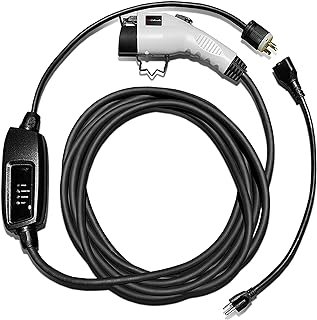
Explore the essential aspects of Portable EV Chargers in this comprehensive guide. Covering everything from types, charging power, and vehicle compatibility, to portability, ease of use, speed, durability, safety, energy efficiency, cost, warranty, and customer reviews, this blog post is your go-to resource for understanding and selecting the ideal charger for your electric vehicle. Dive in to make an informed decision and enhance your EV charging experience.”
What are Portable EV Chargers?
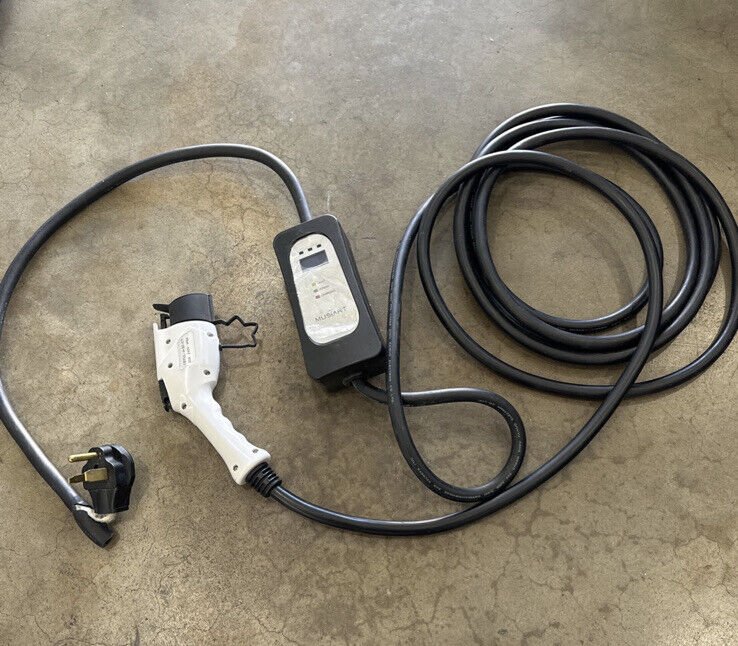
Portable EV chargers are an essential accessory for electric vehicle owners, offering a convenient way to charge their vehicles when away from home or fixed charging stations. Unlike traditional charging stations, which are installed at a specific location, portable EV chargers can be easily carried and used in various settings.
A key feature of portable EV chargers is their adaptability. They are designed to be compact and lightweight, making them ideal for EV drivers who are on the go. Whether you’re taking a road trip, visiting relatives, or need an emergency charging solution, a portable EV charger can be a reliable and practical tool.
These chargers typically plug into standard electrical outlets, and some models are equipped with adapters to fit various socket types. This versatility means that you can charge your electric vehicle from almost anywhere, provided there’s an accessible power source.
The charging power of portable EV chargers can vary, but most are capable of providing a sufficient charge to get you to your next destination or a more permanent charging station. While they may not always offer the rapid charging capabilities of high-powered, fixed stations, they provide a significant convenience and peace of mind for EV users.
Portable EV chargers also come with various safety features to protect both the vehicle and the charger. This includes mechanisms to prevent overcharging, overheating, and electrical surges, ensuring a safe and efficient charging process.
Overall, portable EV chargers are a flexible, convenient solution for electric vehicle charging, especially for those who are frequently on the move. They represent an essential step towards making electric vehicle ownership more practical and accessible for everyone.
Types of Portable EV Chargers
When it comes to recharging electric vehicles (EVs), portable EV chargers offer various options, each designed to meet different needs and preferences. Understanding the types of portable EV chargers available is crucial for choosing one that best suits your lifestyle and your vehicle’s requirements.
1. Level 1 Chargers: The most basic type of portable EV charger is the Level 1 charger. These chargers do not require any special installation and can be plugged into a standard 120-volt AC household outlet. Although they are the slowest in terms of charging speed, offering about 4 to 5 miles of range per hour of charging, their simplicity and universal compatibility make them a popular choice for overnight charging or as an emergency backup.
2. Level 2 Chargers: Level 2 portable EV chargers are a step up, requiring a 240-volt AC outlet, similar to what large appliances like dryers use. These chargers significantly reduce charging time, typically providing about 12 to 80 miles of range per hour of charging, depending on the charger and vehicle capabilities. They are favored by EV owners who need faster charging but still want the convenience of a portable unit.
3. Solar-Powered Chargers: For the eco-conscious driver, solar-powered portable EV chargers present an innovative option. These chargers use solar panels to convert sunlight into electrical energy, which can then be used to charge an electric vehicle. While they are not as fast as Level 1 or Level 2 chargers and depend on sunlight availability, they offer a green, renewable energy source for charging, especially useful in remote locations or during outdoor adventures.
4. Smart Chargers: Smart portable EV chargers are a modern addition, featuring connectivity options such as Wi-Fi or Bluetooth. These chargers allow users to monitor and control charging through a smartphone app.
Some smart chargers also offer features like scheduling charging times, tracking energy usage, or receiving updates about the charging status. They provide an added layer of convenience and control for the tech-savvy EV owner.
Each type of portable EV charger has its unique advantages and limitations. When choosing a charger, consider factors like charging speed, ease of use, compatibility with your vehicle, and where you’ll most likely be using it. By understanding these types, you can select a portable EV charger that aligns perfectly with your charging needs and lifestyle.
Charging
Power
One of the most critical aspects to consider when selecting portable EV chargers is their charging power. The charging power, measured in kilowatts (kW), directly influences how quickly your electric vehicle (EV) can be charged. Understanding the charging power of portable EV chargers can help you make a more informed decision that matches your lifestyle and EV needs.
Low-Power Chargers (Under 3.3 kW): Low-power portable EV chargers are typically those that offer up to 3.3 kW. These chargers are often more compact and convenient for everyday use, especially for overnight charging or topping up your EV’s battery. While they charge more slowly, they are perfect for EV owners who have longer parking periods or don’t require a rapid charge.
Italics: An image of a low-power portable EV charger, possibly with a visual indicator of its kW rating.
Medium-Power Chargers (3.3 kW to 7.4 kW): Medium-power chargers strike a balance between charging speed and portability. These chargers usually provide between 3.3 kW and 7.4 kW of power, offering a faster charging experience than the low-power options. They are suitable for EV owners who need a quicker charge but still value the convenience of a portable charger.
Italics: A photograph showing a medium-power portable EV charger in use, highlighting its size and design.
High-Power Chargers (Above 7.4 kW): High-power portable EV chargers are at the higher end of the spectrum, offering more than 7.4 kW. These chargers significantly reduce charging times, making them ideal for EV drivers who are often on the go and need a quick energy boost. However, they might require access to higher-capacity electrical outlets, which could limit their use in some locations.
Italics: An image of a high-power portable EV charger, with emphasis on its power output and potential charging speed.
The charging power you need depends on several factors, including your vehicle’s battery size, your daily driving range, and how often you can charge your EV. While higher power chargers offer faster charging times, they might not always be necessary for every EV driver’s routine. It’s essential to balance the need for speed with practicality and convenience when choosing the right portable EV charger for your needs.
Compatibility with Vehicles
When choosing portable EV chargers, one of the most crucial considerations is their compatibility with different electric vehicles (EVs). Not all chargers are universally compatible, so it’s essential to understand which types of chargers work with your specific EV model.
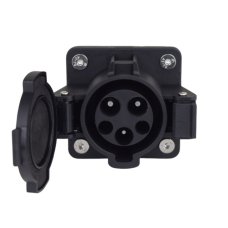
Type 1 (J1772)

Type 2 (Mennekes)
Connector Types: The most common types of connectors for portable EV chargers are Type 1 (J1772) and Type 2 (Mennekes). Type 1 connectors are predominantly used in North America for most EVs, while Type 2 connectors are standard in Europe and increasingly common in other regions. It’s vital to select a charger with a connector that matches your vehicle’s charging port.
Italics: An image showing both Type 1 and Type 2 connectors, highlighting the physical differences between them.
Charging Standards: Different EVs may support different charging standards like CHAdeMO or CCS (Combined Charging System). These standards are more relevant for rapid charging stations, but some portable chargers might offer compatibility with these standards for faster charging options.
Italics: A diagram or infographic explaining CHAdeMO and CCS standards, with a focus on their compatibility with different vehicle models.
Vehicle Specifications: Your EV’s onboard charger also plays a role in compatibility. This built-in component determines the maximum rate at which your vehicle can charge. Even if you use a high-power portable charger, the charging speed will be limited by your vehicle’s onboard charger capacity. Always check your EV’s specifications to understand its charging capabilities.
Italics: A visual table or list showcasing popular EV models and their respective onboard charger capacities.
Manufacturer Recommendations: Many EV manufacturers recommend specific types of chargers or brands that are known to work well with their vehicles. Consulting your vehicle’s manual or manufacturer’s website can provide valuable guidance on compatible portable chargers.
In summary, ensuring the compatibility of portable EV chargers with your specific vehicle is key to a successful and efficient charging experience. This involves understanding the type of connector your EV uses, the charging standard it supports, the capacity of its onboard charger, and adhering to manufacturer recommendations.
Portability Features
Portability is a defining characteristic of portable EV chargers, making them an ideal solution for electric vehicle (EV) owners on the move. When evaluating the portability of these chargers, several features stand out as particularly important.
Size and Weight: The size and weight of portable EV chargers vary, but the most user-friendly models are compact and lightweight. Smaller chargers are easier to store in your vehicle and carry around, making them perfect for travel or emergency use. The ideal charger should strike a balance between being light enough to transport effortlessly and robust enough to deliver sufficient charging power.
Cord Length: The length of the charging cord is crucial for convenience. A longer cord offers more flexibility in where you can park relative to the power source. However, it’s also important to consider cord management; some portable chargers come with integrated solutions for neatly storing the cord when not in use.
Durability: For a device that’s often on the move, durability is key. Look for portable EV chargers that are built to withstand regular use and various environmental conditions. Features like reinforced connectors, robust casing, and weather-resistant materials are indicators of a durable charger.
Ease of Use: Portability isn’t just about physical features; it also encompasses ease of use. Chargers that are simple to set up and use — with clear indicators for charging status and minimal setup requirements — make the charging process more convenient, especially when you’re away from home.
Safety Mechanisms: Finally, safety mechanisms are an integral part of portability. Chargers equipped with features like overcurrent protection, grounding, and temperature control ensure safe usage in various environments and situations.
In conclusion, when selecting portable EV chargers, consider the balance of size, weight, cord length, durability, ease of use, and safety features. These aspects collectively determine how portable and practical a charger is for regular use and travel.
Ease of Use
When it comes to portable EV chargers, ease of use is a critical factor that can significantly enhance the charging experience for electric vehicle (EV) owners. A user-friendly portable EV charger not only simplifies the charging process but also encourages regular use, ensuring that EV owners can make the most out of their vehicles.
Plug-and-Play Functionality: The best portable EV chargers offer plug-and-play functionality. This means that you can simply plug the charger into a power outlet and connect it to your vehicle without needing any complex setup. Look for chargers with intuitive designs and straightforward operations.
Clear User Interface: A clear and informative user interface is essential. Portable EV chargers should have easily readable displays or indicators showing important information such as charging status, power levels, and any error messages. This transparency allows for quick assessments and adjustments if needed.
Adjustable Charging Options: Some portable EV chargers come with adjustable charging options, allowing users to select different charging speeds based on their current needs. This flexibility can be particularly useful for managing charging times and power consumption.
Safety Features: Ease of use also encompasses safety. Chargers with built-in safety features like overcurrent protection, temperature control, and automatic shutoff add an extra layer of convenience and peace of mind for the user. These features ensure that the charger operates safely without requiring constant monitoring.
Portability and Storage: Finally, the overall design for portability and storage contributes to the ease of use. Chargers that are compact, lightweight, and come with features for easy storage (like cord management systems) enhance the user experience, making them more convenient to use and transport.
In conclusion, the ease of use of portable EV chargers is not just about simple operations, but also about the convenience, safety, and adaptability they bring to the charging process. These factors collectively ensure a hassle-free and efficient experience for EV owners.
Charging Speed
Charging speed is a pivotal aspect of portable EV chargers, directly impacting how quickly you can recharge your electric vehicle (EV). Understanding the charging speed of different portable EV chargers helps in selecting a charger that aligns with your lifestyle and EV requirements.
Understanding Charging Speed Metrics: Charging speed is typically measured in kilowatts (kW). The higher the kW rating, the faster a charger can replenish an EV’s battery. It’s essential to match the charger’s output with your vehicle’s charging capacity to maximize efficiency.
Level 1 Chargers: Level 1 portable EV chargers, which plug into standard 120-volt outlets, offer the slowest charging speed, typically around 2 to 5 miles of range per hour of charging. These are best suited for overnight charging or when you have a longer time to recharge.
Level 2 Chargers: Level 2 chargers are significantly faster, requiring a 240-volt outlet (similar to what large appliances use). They can offer about 12 to 80 miles of range per hour, making them suitable for quicker top-ups and more convenient for regular use.
Charging Speed Variability: It’s important to note that the actual charging speed can vary based on several factors, including the vehicle’s make and model, the charger’s maximum output, and the current state of the battery. Some vehicles may not be able to accept the maximum output of higher-powered chargers, which won’t result in faster charging.
Quick Charging Features: Some portable EV chargers come with features that enable quicker charging, such as power boost modes. These modes temporarily increase the charger’s output for a faster charge, useful for short charging windows.
In summary, when choosing a portable EV charger, consider the charging speed in relation to your vehicle’s capabilities and your typical daily usage. While faster chargers offer more convenience, they may also require access to higher-capacity electrical outlets.
Durability and Build Quality
Durability and build quality are crucial factors to consider when choosing portable EV chargers. Given that these chargers are often used in various environments and need to withstand regular handling, investing in a robustly constructed charger is vital for long-term reliability and safety.
Materials and Construction: High-quality portable EV chargers are typically made from durable materials like reinforced plastics or metals that can withstand wear and tear. The construction should be solid, with no loose parts or flimsy components. This ensures that the charger can handle the rigors of regular use, whether it’s being transported in a car trunk, used outdoors, or subjected to different weather conditions.
Weather Resistance: Since portable EV chargers are often used outdoors, weather resistance is an important feature. Look for chargers that are rated for outdoor use, with protection against elements like rain, snow, and extreme temperatures. This not only extends the life of the charger but also ensures safe operation in various conditions.
Cable Durability: The durability of the charging cable is another aspect to consider. The cable should be thick, flexible, and resistant to kinking or fraying. Some chargers feature cables with additional protective coatings to prevent damage and extend their lifespan.
Safety Certifications: Reliable portable EV chargers often come with safety certifications from recognized standards organizations. These certifications indicate that the charger has undergone rigorous testing for safety and durability. Look for marks or labels that show compliance with standards such as UL, CE, or others relevant to your region.
Warranty and Support: A manufacturer’s warranty can be a good indicator of the build quality and durability of their portable EV charger. A longer warranty period suggests confidence in the product’s longevity. Additionally, responsive customer support for maintenance or repair issues adds an extra layer of assurance.
In conclusion, the durability and build quality of portable EV chargers are essential for ensuring not just the longevity of the charger, but also the safety and efficiency of the charging process. When selecting a charger, considering these factors will ensure you invest in a product that can reliably meet your EV charging needs over time.
Safety Features
Safety is paramount when it comes to portable EV chargers. A well-designed charger not only ensures the safety of the electric vehicle (EV) and its users but also enhances the overall charging experience. Understanding the various safety features included in portable EV chargers can help you make a safer choice for your EV charging needs.
Overcharge Protection: One of the most important safety features is overcharge protection. This feature automatically stops the charging process once the EV’s battery is fully charged. It prevents battery damage due to overcharging, thereby extending the lifespan of the battery and maintaining the vehicle’s efficiency.
Temperature Control and Monitoring: Effective temperature control and monitoring are crucial to prevent overheating. Quality portable EV chargers are equipped with sensors that monitor temperature levels during charging. If the temperature exceeds safe limits, the charger will automatically reduce the power or shut off to prevent overheating.
Electrical Surge Protection: Surge protection is vital to safeguard the charger and the EV against sudden spikes in electrical current. This feature is particularly important during storms or unstable electrical supplies, ensuring that both the charger and the vehicle are protected from electrical surges.
Ground Fault Protection: Ground fault protection is another key safety feature. It protects against electric shocks by immediately cutting off the power if a ground fault is detected. This feature is especially important when charging outdoors or in wet conditions.
Durable and Safe Design: In addition to these electronic safety features, the physical design of the charger also contributes to safety. This includes features like robust casings, secure cable connections, and materials that are flame-retardant or resistant to corrosion.
In conclusion, when selecting a portable EV charger, it is essential to consider these safety features. They not only ensure the longevity of your charger and vehicle but also provide peace of mind, knowing that you and your EV are protected against potential hazards during charging.
Energy Efficiency
Energy efficiency is a key consideration in the world of portable EV chargers. An energy-efficient charger not only reduces electricity consumption but also minimizes the environmental impact and operational costs of charging an electric vehicle (EV). Understanding the efficiency of different portable EV chargers can help you choose a more eco-friendly and cost-effective option.
Efficiency Ratings: Portable EV chargers come with varying efficiency ratings, which indicate how effectively they convert electrical power from the source to your EV’s battery. Higher efficiency means more of the power is used for charging and less is lost as heat or other forms of waste energy. Look for chargers with high efficiency ratings (usually expressed as a percentage) to ensure optimal energy use.
Standby Power Consumption: A critical aspect of energy efficiency is the charger’s standby power consumption — the energy it uses when plugged in but not actively charging. Chargers with low standby consumption are preferable as they reduce unnecessary power usage, making them more sustainable and cost-effective over time.
Temperature Efficiency: Efficiency can be affected by operating temperature. Chargers that maintain optimal efficiency across a range of temperatures are desirable, as they ensure consistent performance in various environmental conditions without excessive energy loss.
Smart Charging Features: Some portable EV chargers come with smart features that optimize charging sessions for energy efficiency. These may include scheduling charging during off-peak hours when electricity rates are lower or adjusting the charging speed based on the current demand on the electrical grid.
Environmental Certifications: Consider chargers that have environmental certifications or endorsements. These certifications indicate that the charger meets certain standards of energy efficiency and environmental friendliness.
In conclusion, focusing on energy efficiency when selecting a portable EV charger is beneficial not only for reducing electricity bills but also for contributing to a more sustainable and environmentally responsible EV charging practice.
Cost and Value
When considering portable EV chargers, the cost is a significant factor, but it’s equally important to assess the value they offer. The right balance between cost and value ensures that you invest in a charger that not only fits your budget but also meets your electric vehicle (EV) charging needs effectively.
Initial Purchase Price: Portable EV chargers vary in price, often depending on their power output, features, and brand reputation. Basic models, typically Level 1 chargers, are generally more affordable. In contrast, Level 2 chargers or those with advanced features like smart charging capabilities tend to be pricier. It’s crucial to compare the initial purchase price against the features and benefits each charger offers.
Long-Term Savings: While assessing cost, consider the long-term savings a portable EV charger can offer. Energy-efficient chargers might have a higher upfront cost but can lead to savings on your electricity bill over time. Similarly, a durable and well-built charger might save money on replacement or repair costs in the long run.
Compatibility and Versatility: Chargers that are compatible with a wide range of EV models and can be used in various settings offer better value. A versatile charger that you can use with different vehicles or in different locations (like home, office, or during travel) might be a more cost-effective choice than buying multiple chargers.
Warranty and Customer Support: The value of a portable EV charger is also reflected in the warranty and customer support offered by the manufacturer. A longer warranty period and accessible, helpful customer service can add significant value, providing peace of mind and protection for your investment.
Additional Features: Finally, consider the additional features that enhance the user experience and safety, like overcharge protection, temperature monitoring, or smart charging options. These features, while potentially adding to the cost, can provide substantial value in terms of convenience, safety, and efficiency.
In conclusion, evaluating the cost and value of portable EV chargers involves looking beyond the price tag. Consider long-term savings, compatibility, warranty, and additional features to ensure that you choose a charger that offers the best overall value for your needs.
Warranty and Support
Warranty and support are critical considerations when purchasing portable EV chargers. These factors provide insight into the manufacturer’s confidence in their product and the level of after-sales service you can expect. Understanding the warranty terms and the quality of customer support can significantly influence your satisfaction with the charger.
Warranty Coverage: The length and scope of the warranty offered on portable EV chargers can vary significantly between manufacturers. Generally, a longer warranty period indicates a durable product and a commitment from the manufacturer to stand behind their product. Pay attention to what the warranty covers – some may cover the entire charger, while others might only cover specific components.
Customer Support Services: Quality customer support is essential, especially for products like EV chargers, where technical queries or issues may arise. Look for brands that offer accessible, responsive customer support. This can include various contact methods like phone, email, or live chat, and the availability of comprehensive FAQs or troubleshooting guides on their website.
Ease of Warranty Claims: The process for making warranty claims is another important aspect. A straightforward, hassle-free warranty claim process indicates good customer service. Before purchasing, it’s helpful to read reviews or ask other users about their experiences with the brand’s warranty claims process.
Technical Support and Guidance: Apart from handling warranty claims, consider whether the manufacturer provides technical support and guidance. This can include assistance with installation, usage tips, or troubleshooting advice. Effective technical support can greatly enhance your user experience and ensure you get the most out of your portable EV charger.
Availability of Spare Parts and Repair Services: Check if the manufacturer offers spare parts and repair services for their portable EV chargers. The availability of these services can be crucial for long-term use, especially if you encounter any issues after the warranty period has expired.
In conclusion, when selecting portable EV chargers, a comprehensive warranty and robust support system are indicative of a quality product and a reliable manufacturer. These factors not only provide peace of mind but also ensure that you have the necessary support to address any issues that may arise during the charger’s lifespan.
Customer Reviews and Ratings
When exploring portable EV chargers, customer reviews and ratings are invaluable resources. They provide real-world insights into how the chargers perform, their reliability, and the level of customer satisfaction. Navigating through reviews and ratings can help you make a more informed decision and choose a charger that has been positively received by other users.
Overall Satisfaction: Look for overall ratings, often presented as a star rating out of five. High ratings generally indicate a well-received product, but it’s essential to read through the reviews to understand the reasons behind the ratings. Pay attention to comments on aspects like durability, ease of use, and charging efficiency.
Common Themes in Reviews: Identify common themes in customer reviews. Positive themes might include ease of installation, fast charging speed, or excellent customer service. Conversely, recurring complaints, such as issues with build quality or compatibility, can be red flags.
Longevity and Reliability: Reviews that mention long-term use can provide insights into the charger’s reliability and durability. Look for feedback from users who have had the charger for several months or longer, as this can indicate how well the charger holds up over time.
Comparison with Similar Products: Many users compare their experiences with different brands or models in their reviews. This information can be particularly useful when deciding between similar portable EV chargers. It offers a direct comparison of features, performance, and value for money.
Verified Purchases: Pay attention to reviews marked as ‘verified purchase’ or similar. These reviews are more likely to be genuine and based on actual user experiences, providing a more accurate picture of the product’s performance.
In summary, customer reviews and ratings are powerful tools in assessing portable EV chargers. They offer a glimpse into the experiences of other users, helping you gauge the overall quality and suitability of the charger for your needs.
Conclusion and Recommendations
In conclusion, selecting the right portable EV charger is a decision that encompasses various factors, each contributing to the overall charging experience for your electric vehicle. From understanding the different types of chargers available, their charging power, and compatibility with vehicles, to considering portability features, ease of use, charging speed, and the essential aspects of durability, safety, energy efficiency, cost, warranty, and customer reviews – each element plays a pivotal role in ensuring you choose a charger that not only meets your immediate needs but also stands the test of time.
As the world of electric vehicles continues to evolve, the importance of having a reliable, efficient, and convenient charging solution cannot be overstated. Portable EV chargers offer the flexibility and freedom to keep your vehicle charged and ready, whether you’re at home, at work, or on the road. They are not just accessories, but essential tools that enhance the EV ownership experience.
When making your choice, balance practicality with performance. Consider not just the upfront cost, but the long-term value the charger provides. Look for a charger that delivers a combination of robust build quality, necessary safety features, and the right specifications to match your vehicle. Remember, a good portable EV charger is an investment in your EV’s future, ensuring you can enjoy the benefits of electric driving with greater ease and convenience.
Finally, always keep an eye on the evolving technology and standards in EV charging. As innovations emerge and the market for electric vehicles grows, staying informed will help you make the most of your EV and its charging capabilities.
Thank you for reading, and we hope this guide has been helpful in your journey to find the perfect portable EV charger. Safe travels and happy charging!
